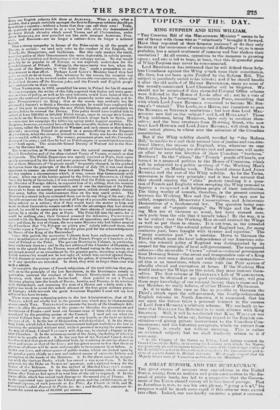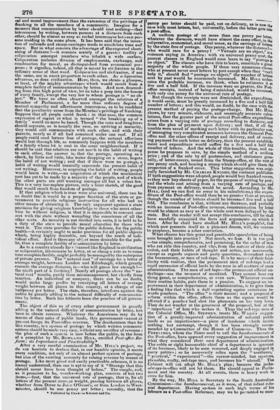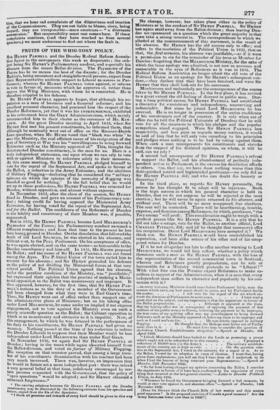A GREAT REFORM, AND THE BUREAUCRACY. THE great excess of
revenue over expenditere in the United States, arising from an uniform awl perm went system in the dis- posal of public lands, has led to a sttggestioo that the Govern- ment of the Union should convey all It.: tors free of postage. Fast as Jonathan is now, to use his own phrase, " going alt, a 1," his progress would be much more rapid if this scheme were carried into effect. Indeed, one can hardly conceive a great r economi intercourse by writing. between persons at a distance from each A unifornt postage of no more than one penny per letter, other, should be almost as easy as verbal intercourse between per- whatever the distance, would have almost the same effect, in the sons residing in the same place. It has been said that the limn- cooperative, economical, and moral sense, as the carriage of letters tion or railroads and steam-carriages tends to annihilate lime and by the state free of postage. One penny, whatever the distance!—. space. But in what consists the advantage of the expected short- who would care for a penny ? "Victuals are no object," is a ening of distance ?—it consists mainly of a greater facility of common saying in America : with an universal penny-post, the coOperation amongst numbers who inhabit a wide surface. poorest classes. in England would soon learn to say 1;postage is Coiiperation includes division of employments, exchange, and no object." The classes who have this to learn, constitute a great combination for motel, as distinguished ftom economical pity- . majority of the whole people. If those very numerous classes poses ; it signifies, indeed, all that is meant by civilization in the• of every family, except the very few to whom postage is " no ob- But though the receipts were not diminished, the expenditure, ject." We have so often observed amongst the relatives or a it would seem, must be greatly increased by a five and a half fold Member of Parliament, a far more than ordinary degree of number of letters; and this would, no doubt, be the case with the mutual sympathy and affectionate intercourse, as to be confident present method of paying the postage-charge. But Mr. HILL that the peculiarity arose from the Member's privilege of franking. shows, by very minute, elaborate, and seemingly accurate caleu- Suppose that all people could frank : in that case, the common lotions, that the greater part of the actual Post-office expenditure expression of regret at what is termed " the breaking up of a arises from a varying rate of postrwe according to distance, and family " would no more be heard. Though the sons and daughters from the plan of payment upon delivery ; and that, if all the should separate, as is usually the case, on arriving at maturity, trouble were saved of marking each letter with its particular cost, they would still communicate with each other, and with their of managing very complicated accounts between the General Post. parents, nearly as if all had remained under one roof. If all office and the other offices of receipt and delivery, and of receiv- people could send letters free of postage, the natural affections ing payment for each letter on delivery, then the present establish. would last through life, as commonly happens with the members ment and expenditure would suffice for a the and a half fold of a family whose lot is cast in the same neighbourhood. If it number of letters. And the whole of this trouble, time, and ex- should be said that relatives are not muolt in the habit of writing pense he proposes to save, by the simple method of a uniform to each other, the answer is, that the postage, operating as a price ; and of the sale by all postmasters, and stationers gene. check, by little and little, like water dropping on a stone, begets mlly, of letter-covers, issued from the Stamp-office, at the rate of the habit of not writing ; and that if there were no postage, a one penny each, and bearing a stamp which should give them the habit of writing would naturally supersede the present habit of properties of a franked cover. This latter suggestion was origi. not writing. Moreover, in acquiring the habit of writing, people nails, furnishedby Mr. CHARLES KNIGHT, the eminent publisher. would learn to write,—an acquisition of which the mechanical If bgth suggestions were adopted, people would buy franked covers, part has yet to be made by a majority of the people, and of which as they now buy sheets of paper, for the purpose of writing by post; the other parts are still wanting amongst all but a select few. and the whole cost arising from a varying rate of postage, and This is a very incomplete picture, only 3 faint sketch, of the good from payment on delivery, would be saved. According -to Mr.
that would result from freedom of postage. HILL, (and we can find no error in his calculations,) the expen-
If that religion which is true were also universal, there can be diture of the Post-office would then be no greater than at present, no doubt that it would be a proper function of the state or go- though the number of letters should be increased five and a half vernment to provide religious instruction for all who had no fold. The conclusion is that, without any decrease, and probably other means of obtaining it. The only argument against a state with an increase of Post-office revenue, communication by letter provision for giviug religious knowledge to those who must other-
would be almost as easy as if the whole cost were defrayed by the wise be without religion, is that it is impossible to connect one state. But the reader will not accept this conclusion, till he shall sect with the state without wounding the conscience of all the have carefully examined the facts and arguments on which it other sects. As morality is not divided into sects, it is held to be
rests. After he shall have studied Mr. HILL'S pamphlet, that a duty of the stwe to provide moral education for those who
which now presents itself as a pleasant dream, will, we venture want it. The state provides for the public defence, for the public health—it certainty ought to make provision for all public objects What chance has this great and practicable speculation of being which, being highly desirable, are beyond the reach of indi- soon brought into practice ? Not much, we fear. It is too good vidual effort. And is there any ohj, et more desirable for the pub- —too simple, comprehensive, and promising, for the order of men lie, than a complete facility of communication by letter, cation, and their habits of thought and action, are necessarily, or cuiiperation, intercourse bs letter, at so cheap a rate as to come except as regards organic and party questions, dependent upon near complete facility, might probably be managed by the enterprise
the bureaucracy, or men of red-tape. It is by means of their fami- of private persons. The "natural cost" of carriage for a letter of
average weight, between London and Edinburgh, which greatly liarity with routine, that the permanent men of red-tape lead a exceeds the average distance, is—who will guess low enough ?— rapid succession of official lords by the nose in all matters of mere the ninth part of a farthing! Nearly all postage above the " na-
items,—first, that the universal rate of postage, that is, for all
who at present never aend letters by post except when they "can't ordinary sense of that word. CLOpetation and civilization, if not help it,' should find " postage no object,' the number of lettets the same, are in exact proportion to each other. As ci operation sent by post would be enormously increased. Mr. HILL under- advances, so does civilization. Here, then, we obtain a glimpse, rates the probable increase, we think, when he estimates it at at least, of the mighty advantages which would result from a five and a half fold. If the increase were no greater, the Post- complete facility of communication by letter. And now. descend- office receipts, instead of being diminished, would be increased, 1 ing from this high point of view, let us take a peep into the bosom with only one penny for the universal rate of postage.
If that religion which is true were also universal, there can be diture of the Post-office would then be no greater than at present, no doubt that it would be a proper function of the state or go- though the number of letters should be increased five and a half vernment to provide religious instruction for all who had no fold. The conclusion is that, without any decrease, and probably other means of obtaining it. The only argument against a state with an increase of Post-office revenue, communication by letter provision for giviug religious knowledge to those who must other-
would be almost as easy as if the whole cost were defrayed by the wise be without religion, is that it is impossible to connect one state. But the reader will not accept this conclusion, till he shall sect with the state without wounding the conscience of all the have carefully examined the facts and arguments on which it other sects. As morality is not divided into sects, it is held to be
rests. After he shall have studied Mr. HILL'S pamphlet, that a duty of the stwe to provide moral education for those who
which now presents itself as a pleasant dream, will, we venture want it. The state provides for the public defence, for the public to prophesy, become a sober conviction. What chance has this great and practicable speculation of being which, being highly desirable, are beyond the reach of indi- soon brought into practice ? Not much, we fear. It is too good vidual effort. And is there any ohj, et more desirable for the pub- —too simple, comprehensive, and promising, for the order of men lie, than a complete facility of communication by letter,
who yet rule this country, and who, from the nature of their cdu- As to a country already fare .1vanced like England in civilization
cation, and their habits of thought and action, are necessarily, or cuiiperation, intercourse bs letter, at so cheap a rate as to come except as regards organic and party questions, dependent upon near complete facility, might probably be managed by the enterprise
the bureaucracy, or men of red-tape. It is by means of their fami- of private persons. The "natural cost" of carriage for a letter of
average weight, between London and Edinburgh, which greatly liarity with routine, that the permanent men of red-tape lead a exceeds the average distance, is—who will guess low enough ?— rapid succession of official lords by the nose in all matters of mere the ninth part of a farthing! Nearly all postage above the " na- tural cost" results, partly from mismanagement, but chiefly from derlings—are the meanest of mankind. They cannot bear any taxation. An individual or company, there can be no doubt, thing great, or comprehensive, or even new. Whatever crosses would make large profits by conveying all letters of average their routine habits, puts them in a passion. To suggest an im- weight between all places in this country, at a charge of one provement in their department of administration, is to give them halfpenny per letter. The state, therefore, interferes against the a feeling like that which a dull vegetating squire entertains to- public by greatly adding to the natural difficulty of communica- wards poachers. "The office" is their manor; and a proposal of Sion by letter. Such has hitherto been the practice of all govern- reform within the office, affects them as the squire would be
zoents. affected if a poacher had shot the pheasants on his very lawn. The object of this as of every other government in greatly They do not wonder at the greatness of the proposal, but at the ,,impudence " of him who makes it. Thus the red-tape man of adding to the natural difficulty of communication by letter, has the Colonial O been to obtain revenue. Whatever the Americans may do by Office, Mr. STEPHEN, treats Mr. WARD'S sugges- means of their sales of public lands, this government cannot at tion Of a greatly-improved administration of colonial public lands as an impertinence—a piece of insolence which merit; present forego its Post-office revenue. The desideratum then for this country, is a system of postage by which written communi- nothing but contempt, though it has been strongly recom- cations should be made very easy, without any sacrifice of revenue : mended by a Committee of the House of Commons. Thus the the public, in the form FREELINGS, whom the Times used to call the bumbureaucrats of the plan of such a system is now before the of a pamphlet by Mr. ROWLAND HILL, entitled Post-ogice Re- Post-office, have opposed every suggestion of improvement in what they considered their own department of administration. form ; its Importance and Practicability.* After a very careful examination of Mr. Hrtt's project, we The noble or right honourable chief of a department is ignorant d of its business, likely to be soon removed, and deeply engaged in o not hesitate to declaie that, in our humble opinion, it meets every condition, not only of an almost perfect system of postage, party polities ; so tie necessarily relies upon the " assiduous, practical," " experienced "—the narrow-minded, but specious, but also of the existing necessity for raising revenue by means of " postage. Like most great and easily practicable schemes, it is no plausible, crafty, red-tape man, and becomes his" utensil.' The sooner understood, than one is apt to say of it "Strange that this Cabinet will not adopt Mr. Hines plan; because the jacks" should never have been thought of before." The simple, and, always-in-office will not let them. He should appeal to Parlia- as it promises to be, wonder-working plan, consists of but two ment and the country. At all events, there is heavy work in store for him.
letters of the present average weight, passing between all places, By the way, Mr. Hitt is Secretary to the South Australian whether front Dover to Jullii O'Groat's, or from London to West- Commission—the bumbureaucrat, as it were, of that infant cobs- minster, should be one penny per letter ; secondly, that the nial department. Having spoken in such high terms of his • Published by CHAIII.F111 KNIGHT sad co. labours as a Post-otlice Reformer, may we be permitted to men- tion, that we hear sad complaints of the dilatoriness and inaction of the Commissioners. They are not liable to blame, since, being unpaid, they are irresponsible—mere amateurs—" a dilettante aomtnission." But responsibility must rest somewhere. If these complaints continue, (end they have reached us from several quarters.) we must endeavour to find out where the fault is.




























 Previous page
Previous page